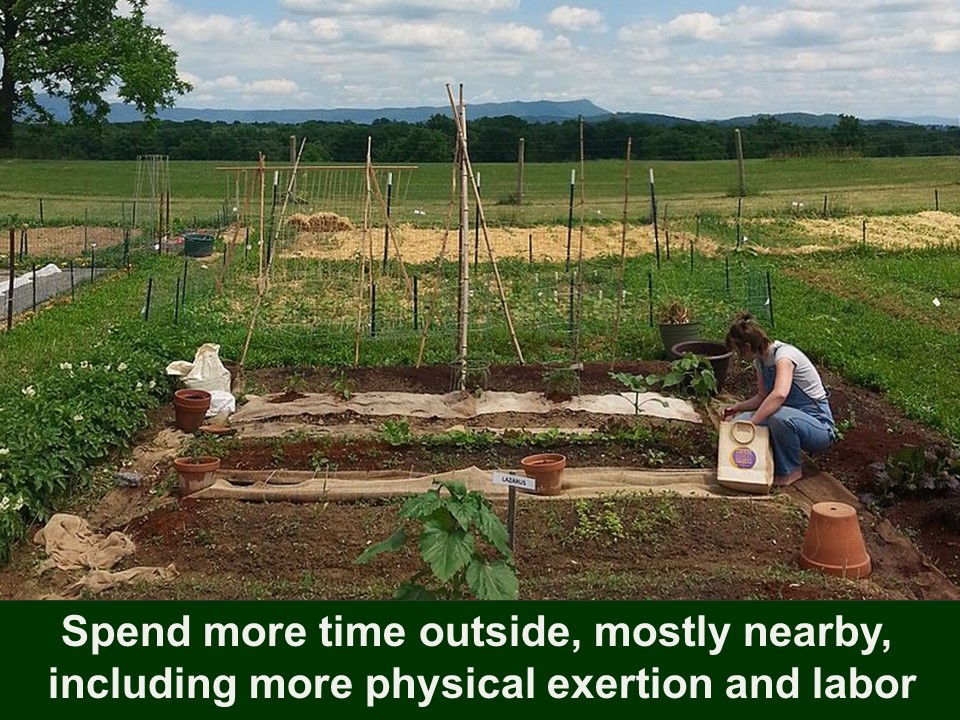A 5-step Program for What Ails us. Third Installment
Posted by Martin Ogle on Jan 3, 2020 in All Posts | Comments Off on A 5-step Program for What Ails us. Third Installment
Step 3 – Spend more time outside, mostly nearby, including more physical exertion and labor.
This is the third installment in a series of 5 musings under the theme of “A 5-step Program for What Ails Us.” The first installment introduced the theme an explored Step 1: “Yes, No or Maybe “Slow down and simplify overall.” The titles of the remaining 2 installments are found at the end of this musing.
There is a large and growing body of evidence that shows that as people spend more time inside and in front of screens, we suffer health problems, attention deficit and anxiety and we are less and less familiar with the places we live and how human beings fit in with the rest of nature. If you’ve not yet had the chance, read or at least look up, Richard Louv’s Last Child in the Woods (or any number of his other books and essays). The evidence contained in Louv’s writings (and that of many others) is compelling.
Getting outside on a regular basis for significant amounts of time is good for our physical and mental health. It gives us perspective, enables us to slow down and offers us valuable lessons for creating a healthy human relationship with the rest of Nature. Being in the elements, with sun or rain on our face, immersed in the grand, stately rhythms of Life is how and where our species grew up . . .being outside is a necessary part of curing what ails us.
The idea of outdoor time being healthy for us is important, but certainly not novel or new. And, how and where we choose to get outdoors also matters if we want to consider what ails us at both the personal and societal levels. For instance, while outdoor experiences in far-away, exotic places can be amazing and rewarding, they also come with a cost. The energy required to transport ourselves (and, often all our toys) to distant locations to recreate outside is significant. If we want to address the full range of what ails us – from our personal health and well-being to the impacts of fossil fuel use such as habitat loss to climate change – we need to reduce our carbon footprint and not travel so much. See what you think about this post, The Peculiar Symbiosis of the Outdoor Recreation and Oil and Gas Industries.
An occasional trip to be outdoors far from our home can definitely be soul-feeding. But, in the spirit of Step 1 in this series (“Yes, No or Maybe – be proactively honest, clear and respectful with ourselves and each other”) its important that we not fool ourselves. The energy used for travel, the development of tourist locations and other consequences of recreating in far-away places have significant impacts and cannot be dismissed. That’s why I think we need to Spend more time outside, mostly nearby.
A final thought on getting outside as part of curing what ails us: Aldo Leopold, an eminent ecologist of the early 20th century, wrote in his book, A Sand County Almanac, that “There are two spiritual dangers [my emphasis] in not owning a farm. One is the danger of supposing that breakfast comes from the grocery, and the other that heat comes from the furnace.” This is an odd, even jarring thought in the 21st century – how could it be spiritually dangerous to suppose that breakfast comes from a grocery and that heat comes from a furnace? I believe the answer lies in the fact that very few of us, these days, have to physical exert ourselves very much in the service of our physical well-being, let alone our survival. This contrasts with our very biology and history in which physical labor was integral to our humanity. When we do not understand, viscerally, the energy that goes into our needs and wants – especially feeding ourselves and (in cold climates) heating ourselves, we unconsciously assume that life can go on, in a way we’ve become accustomed to, without consequences. It’s not an accurate assumption, and we subconsciously suffer for it. A lack of physical activity in the form of exercise is not good for our physical health. Leopold might say that a lack of physical activity in service of our basic needs leaves a spiritual vacuum.
We will almost definitely need to expend much more human labor to make our lives work in the future. But that’s not a bad thing unless we bail on our current responsibilities to make sustainable transitions to a new age. If we don’t move quickly towards a sustainable society – one in which our human systems are more closely balanced with Earth’s living systems – we could very well end up with lives of hard and tedious labor. If we do make successful transitions, we could enable healthy, happy human life work with a healthy and life-affirming level of human energy. (For more on this, see “In Praise of Human Energy.”)
Steps 1,2, 4 and5
Step 1 – Yes, No or Maybe – be proactively honest, clear and respectful with ourselves and each other
Step 2 – Slow down and simplify overall.
Step 4 – Help envision and create an economy based on human well-being directly, not on growth for its own sake
Step 5 – Quickly empower youth create a new economy, not replicate the present one
(Steps 1 and 2 have been addressed in previous musings; 4 and 5 will be addressed in future Musings)






